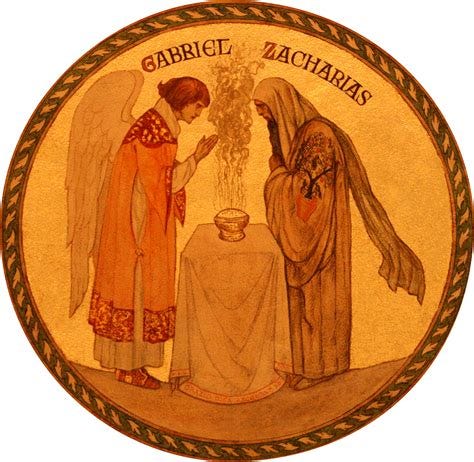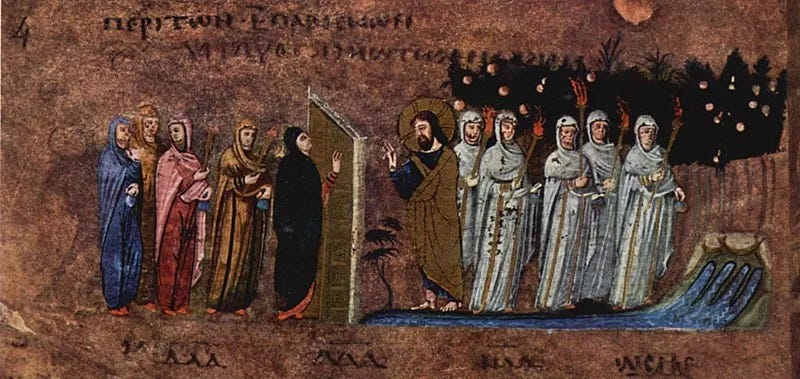In the first chapter of Luke’s gospel, the Archangel Gabriel appears to Mary with a proposition as well as an announcement. There is dramatic tension as he describes the reason for his visit.
And having come in, the angel said to her, “Rejoice, highly favored one, the Lord is with you; blessed are you among women!” But when she saw him, she was troubled at his saying, and considered what manner of greeting this was. Then the angel said to her, “Do not be afraid, Mary, for you have found favor with God. “And behold, you will conceive in your womb and bring forth a Son, and shall call His name Jesus. “He will be great, and will be called the Son of the Highest; and the Lord God will give Him the throne of His father David (Luke 1:28-32).
The scene starts off quite logically considering the highly unusual circumstances. Mary is greatly troubled by what the angel is saying and wonders what is happening. Not only will she bear a son, he will be the son of God himself and his name will be Jesus? In Hebrew, “Jesus” means “salvation from Yahweh,” so this child will also be the Messiah?
Then Mary said to the angel, “How shall this be, since I do not know a man?” (Luke 1:34)
Some English translations render the Greek word εσομαι or esomai incorrectly as “can” instead of correctly as “shall.”1 Rendering it as “can” creates the false impression that Mary is doubtful that God can do as Gabriel says. In the original Greek, Mary explicitly says that she does not have sexual relations with a man by using the word “knowing” (Greek γινωσκω or ginosko) which is a Jewish euphemism for sexual intercourse. Aware of this, she is understandably curious how this birth will happen, not necessarily questioning if it will happen. Her remark indicates a humble obedience. Gabriel says that she will bear God’s son and she responds, “How can this be?” She is not asking if it is possible to happen, but how she can cooperate to make it happen.
Just as the fallen angel Satan had a dialogue with the Old Eve to convince her of a course of action, the angel Gabriel does the same but with an opposite purpose. In the course of their dialogue, Gabriel brings up the unexpected pregnancy of her cousin Elizabeth, a barren older woman. Why does Gabriel do this? Was Mary not previously aware of Elizabeth’s pregnancy? That isn’t very likely. Gabriel is reminding her of what she already knows. Elizabeth and Zechariah are intimate enough relatives that Mary will travel a considerable distance to spend three months of her pregnancy with them until Jesus’ cousin John the Baptist is born. Everyone also knows that Zechariah has been mute for months since the same angel Gabriel appeared to him in the Temple to announce that his wife Elizabeth would bear a son.
Gabriel’s dialogue with Zechariah is not a complete success. Zechariah doubts his word.
And Zacharias said to the angel, “How shall I know this? For I am an old man, and my wife is well advanced in years” (Luke 1:18).
“How shall I know this?” does not mean, “I don’t fully understand,” rather it means “how do I know what you’re saying is true?” The angel’s response is immediate and brutally direct.
“I am Gabriel, who stands in the presence of God, and was sent to speak to you and bring you these glad tidings” (Luke 1:19).
To colloquially paraphrase him: “How do you know this? Maybe it’s because I am the Archangel Gabriel who eternally stands in God’s presence and I’m bringing you this message directly from God himself? That’s how!”
For his skepticism, Zechariah is struck mute. But why is his punishment to be silenced? Like almost every “punishment” of God’s, it may actually be an act of mercy. It is possible that Zechariah was a wise guy who tended to sin with his tongue, perhaps by being irreverent, or perhaps he was a cynic. He would be more careful after this, but that doesn’t seem likely since Luke describes him and Elizabeth as “righteous before God, walking in all the commandments and ordinances of the Lord blameless” (Luke 1:6).
However, hints of an answer may lay elsewhere. John would become particularly known for his zeal. He would unflinchingly speak truth to power, such as when he publicly condemned King Herod Antipas for marrying Herodias, his brother's wife (Matthew 14:1-12). Those words ended up costing him his head. According to Tradition, John was conceived with original sin which was wiped away when he “leaped” in Elizabeth’s womb after hearing Mary’s voice and recognizing Jesus in Mary’s womb (Luke 1:41).
Like John, the prophet Jeremiah was also born sinless. He was also known for speaking truth to power, his zeal, and calls for repentance. He foretold the destruction of Jerusalem by Babylon, just as the Messiah heralded by John would foretell the final destruction of Jerusalem and Old Covenant Judaism. Certainly, a figure such as John, particularly as the primary forerunner of the Messiah, needed to be holy and sinless to an exceptional degree. While Judeo-Christian tradition does not believe that the sins of the fathers are visited upon the sons — rather that each of us bears individual responsibility for our sins — there is a recognition among Catholic exorcists that hereditary influences such as generational spirits exist in families. These spirits typically gain entry through family authority figures, particularly fathers. Individual demons are associated with specific sins. The greatest “demon of doubt” is Satan himself who caused Eve to doubt the word of God in Eden (Genesis 3:1) and was subsequently called the “Father of lies” by Jesus (John 8:44). John the Baptist and his family were so critical to God’s plan of salvation that Satan could have taken it upon himself to tempt Zechariah to doubt the word of God delivered by Gabriel. A malign influence that powerful could not be tolerated in the extended family of the Messiah himself. Even though Zechariah was regarded as a godly man, he needed to be sharply rebuked for his own good and the good of his family.
Mary surely had to know what happened to Zechariah, but that doesn’t disturb her. Before she gives her consent, she wants to know exactly what will be expected of her. She freely engages in a dialogue with Gabriel. We can see her easy familiarity with the things of God that we will see again, particularly at the Wedding at Cana when she does not take no for an answer from her son. Authentic familiarity goes both ways, if she is comfortable with God, then it is also likely that God is just as comfortable with her. Their communication is honest and open.
The mention of Elizabeth is not a way for Gabriel to remind her of the obvious — that God can do incredible things. It ties together two cosmically consequential pregnancies. Elizabeth’s son will be John the Baptist, the great forerunner of Jesus. The conversation with Zechariah occurs on Yom Kippur,2 the “Day of Atonement,” which is the holiest day of the year in Judaism. The day's main observances consist of full fasting and asceticism, both accompanied by extended prayer services and sin confessions. John the Baptist’s whole life is one of fasting, asceticism, and repentance.
Then Paul said, “John indeed baptized with a baptism of repentance, saying to the people that they should believe on Him who would come after him, that is, on Christ Jesus” (Acts 19:4)
John himself understands and teaches that his baptism is a forerunner of the baptism of the Holy Spirit that his cousin Jesus will usher in. John knows that his task is to diminish so that Jesus will increase (John 3:30).3
The one who will baptize with the Spirit “is He who coming after me, is preferred before me, whose sandal strap I am not worthy to loose” (John 1:27).
Gabriel foretells this to Zechariah.
“For he will be great in the sight of the Lord, and shall drink neither wine nor strong drink. He will also be filled with the Holy Spirit, even from his mother’s womb. “And he will turn many of the children of Israel to the Lord their God. “He will also go before Him in the spirit and power of Elijah, ‘to turn the hearts of the fathers to the children,’ and the disobedient to the wisdom of the just, to make ready a people prepared for the Lord” (Luke 1:15-17).
There is no specific Church tradition that Mary was directly tempted by Satan during the Annunciation similarly to Eve’s temptation in the Garden, but as we have seen, he have may have attempted indirect ways, such as gaining a foothold within her family through Zechariah and perhaps other unrecorded ways. Satan could not afford to let any opportunity pass to seduce the New Eve just as he successfully seduced the Old Eve. After all, Mary was destined to crush his head if he couldn’t do something to stop her.
Both women were immaculately conceived and therefore were not subjected to concupiscence. However, Eve made a free choice that resulted in catastrophe. Mary could also have taken counsel of her pride and fears and have done the same. Even though Mary, unlike Eve, avoided even the near occasions of sin, and her attitude from the beginning was humble submission to God’s will, Gabriel and heaven still must have been in suspense until she actually gave her assent. Mary’s purpose in questioning Gabriel was to understand better what she was being asked to do so she could cooperate better with God’s plan.
And the angel answered and said to her, “The Holy Spirit will come upon you, and the power of the Highest will overshadow you; therefore, also, that Holy One who is to be born will be called the Son of God” (Luke 1:35).
So that’s how. No man needs to be involved and she needs to do nothing but consent. The Holy Spirit will overshadow her and the Son of God will be born. While she is humble and submissive, she is no pious automaton, which makes her fiat even more impressive.
Then Mary said, “Behold the maidservant of the Lord! Let it be to me according to your word” (Luke 1:38).
We rightly place Mary and her experiences in a more exalted category than our own. She is to be the Spouse of the Holy Spirit and bear his Son. Only Mary will ever be asked to do those things. Yet, as amazing as her calling is, God’s calling of us is the same in that we are all meant to be espoused to God. The Bridegroom is waiting in the Tomb for each of us. We only need to consent and prepare for our espousal. Mary asked the angel how she could prepare and cooperate with God’s plan. Because of her love, her lamp is full (“Hail Mary full of Grace”) and she is already prepared.4 The Bridegroom is waiting to do the rest. We all need to follow Mary’s example.
In the meantime, heaven waits in suspense for each of us.
Unfortunately, this includes the USCCB online bible, which incorrectly translates esomai as “can.” Even most Protestant bibles, such as the KJV correctly translate it as “shall.”
John Parsons, “Christmas, - Was Jesus born on December 25th?” Hebrew For Christians, accessed June 23, 2025, https://www.hebrew4christians.com/Holidays/Winter_Holidays/Christmas/christmas.html#:~:text=July)%2C%20because:-,John's%20father%20(Zechariah)%20was%20a%20Levite%20who%20was%20assigned%20to,1:8%2D23.
In the Church Calendar, John the Baptist’s feast is in June near the summer solstice, the longest day of the year, while Jesus’s feast is Christmas in December, near the winter solstice. One’s light diminishes while the other increases from then on.
Mary is like the “good virgins” whose lamps are full of their grace.







